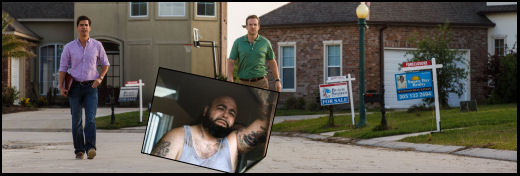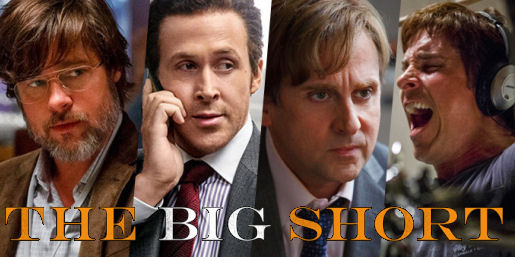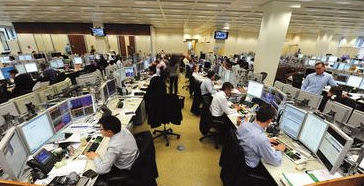
 This last weekend, I finally saw the film, The Big Short, the Academy Award winning movie about the 2008 financial collapse. I’d spent more time than I’d like to admit looking into the ins and outs of what happened, and when I heard there was a movie, I wondered how they were going to present it. Would it be about Bob and Wendy Graham’s campaign to create the Derivative Market, abetted by Fed Chairman, Alan Greenspan? or about Brooksley Born’s valiant attempts to stop it? or the raters who overvalued the CDOs? or maybe about the visionary Yale economist, Robert Shiller, and his book, Irrational Exuberance that predicted the whole thing? or the simple fact that no market can ever keep growing forever? There were so many angles.
This last weekend, I finally saw the film, The Big Short, the Academy Award winning movie about the 2008 financial collapse. I’d spent more time than I’d like to admit looking into the ins and outs of what happened, and when I heard there was a movie, I wondered how they were going to present it. Would it be about Bob and Wendy Graham’s campaign to create the Derivative Market, abetted by Fed Chairman, Alan Greenspan? or about Brooksley Born’s valiant attempts to stop it? or the raters who overvalued the CDOs? or maybe about the visionary Yale economist, Robert Shiller, and his book, Irrational Exuberance that predicted the whole thing? or the simple fact that no market can ever keep growing forever? There were so many angles.
 [spoiler alert!] But the way they did it was a surprise to me and just plain brilliant by my estimate. They told the story through the eyes of the few people on the edges of Wall Street who saw it clearly from the start, and when they hit parts where the movie-goer needed a few complicated things explained, they mimicked a technique from antiquity, the Greek Chorus, in the form of a blond in a bubble bath, a player at a roulette table, or an actor stepping out of character and talking directly to the audience – truthsayers on the sidelines. I thought it was one fine piece of film-making!
[spoiler alert!] But the way they did it was a surprise to me and just plain brilliant by my estimate. They told the story through the eyes of the few people on the edges of Wall Street who saw it clearly from the start, and when they hit parts where the movie-goer needed a few complicated things explained, they mimicked a technique from antiquity, the Greek Chorus, in the form of a blond in a bubble bath, a player at a roulette table, or an actor stepping out of character and talking directly to the audience – truthsayers on the sidelines. I thought it was one fine piece of film-making!
 Back when the markets crashed [September 15, 2008], I hadn’t seen it coming. But thinking back on things, like a lot of people, I registered some of the warning signs without realizing what they were warning us about. Some years before, I had needed some money to pay for the last of our two girls’ college costs and had refinanced my house – standard operating procedure in those days. To my surprise, lenders were calling us at home vying to get our loan. It was actually kind of fun. I did a spreadsheet model of all the loan parameters, and my wife spent the days fielding the calls and using my model to compare the offers. But the significance eluded me. In 2004 when we sold our home to move out of the City, I was staggered [pleasantly staggered] by the
Back when the markets crashed [September 15, 2008], I hadn’t seen it coming. But thinking back on things, like a lot of people, I registered some of the warning signs without realizing what they were warning us about. Some years before, I had needed some money to pay for the last of our two girls’ college costs and had refinanced my house – standard operating procedure in those days. To my surprise, lenders were calling us at home vying to get our loan. It was actually kind of fun. I did a spreadsheet model of all the loan parameters, and my wife spent the days fielding the calls and using my model to compare the offers. But the significance eluded me. In 2004 when we sold our home to move out of the City, I was staggered [pleasantly staggered] by the  selling price. But I just thought of it as our good fortune, saying, "Boy, this neighborhood has sure come up since we moved here twenty-five years ago." It never dawned on me that the banks were gathering mortgages not as investments, but to use as chips for playing in the huge casino called the Commodities Market [futures] – creating illusions, the inflated values that I had just taken advantage of.
selling price. But I just thought of it as our good fortune, saying, "Boy, this neighborhood has sure come up since we moved here twenty-five years ago." It never dawned on me that the banks were gathering mortgages not as investments, but to use as chips for playing in the huge casino called the Commodities Market [futures] – creating illusions, the inflated values that I had just taken advantage of.
I doubt that many among those of us who follow blogs like this didn’t find ourselves making analogies with the pharmaceutical industry and the Irrational Exuberance [and corruption] in psychopharmacology marketing that has plagued psychiatry for the last quarter century. I won’t catalog all the obvious things that seemed parallel to me, but I want to mention one conceptual piece – futures. The traditional products traded on the Commodities Market are next season’s soy beans – growers selling their crops in advance to raise the money needed to plant and run their farms – buying and selling future value. The buyers take out insurance to cover their losses in case of a draught etc. With deregulation, that way of buying and selling future value was expanded to encompass almost anything and everything. And what better product than home mortgages – a guaranteed future value. For that matter, what better way to market tepid drugs to a hot market than to present them as on a continuum of future promise?
We’ve lived in a world where "new! improved!…" has been a permanent meme for our toothpaste and wash·day products. And it was easily transported to the psychopharmacology world of the 1980/1990s. The formula seemed to be keeping up an exuberant rhetoric of future-breakthroughs-just-around-the-corner, deceptive presentations maximizing efficacy and minimizing harms in scientific journals, expert testimonials and endorsements from all the right academic places, and questionable marketing techniques. The result has been a couple of decades when the psychiatric drugs have been consistently on top of the sales charts – an almost unimaginable outcome in a rational world. It happened with only two basic drug classes – the SSRIs and the Atypical Antipsychotics. And in spite of the pharmaceutical industry literally shutting down its CNS research several years ago, the so-called empty pipeline continues to produce "new! improved!…" versions of these drugs [see a future blog]. But unlike the mortgage futures market or something like the Madoff Ponzi scheme, it doesn’t seem that this version yet has any built-in ending. So long as the story line of future promise persists and new is still presumed to mean better, the drugs we call me too drugs keep on coming and remain successful.
One of the effective aspects of The Big Short was the subtle way it portrayed the real message of the story, how the Irrational Exuberance of the business end of the housing bubble either lost sight of or didn’t care about its impact on our everyday world [another analogy]. The graphic at the top was a scene of a visit to a defunct neighborhood of unoccupied new houses. And the six million who lost homes were represented by only one man [the insert picture above], but he got the message across in a only few brief appearances. The shots of traders being marched out of Lehman Brothers with boxes of personal items added to that side of the message – participant·victims, many of whom unlikely completely knew what they had been a part of until they entered the ranks of the disillusioned.
Mickey,
As a long time investor and a survivor of two market crashes that were basically designed by Wall Street and also as a guy who just watched the Big Short last week himself – I think there is a fundamental difference between financial services and medicine.
The amount of unprosecuted fraud in financial services is astounding. In the film, it was clear that all the protagonists knew there was an unprecedented level of fraud and collusion among the rating agencies and the CDO issuers. The film makes a point that only one person went to jail. By contrast, about 20 years ago I was sitting in a room listening how the FBI could send me and my colleagues to federal prison on racketeering charges if we:
A. Didn’t have enough bullet points in our notes to match the billing codes.
B. Had the audacity to not write separate notes from our trainees (a major clinic had just been sued for a hundred million dollars because the attendings just signed off on the resident’s notes instead of rewriting their own).
This is not the first or last time that highly leveraged activity will threaten the world financial markets. The original debacle was the Long Term Capital Management fiasco and collapse in 1998. At the time of the collapse they were leveraged 250 to 1. At the time prominent bankers and economists were calling it an anomaly. The Big Short illustrated that the same thing happened in 2008 and at the end of the film that it has just started happening again.
Banking and the managed care industry are similar at a couple of levels. Both of them are funded essentially by high taxes on the American people that guarantee profits. Both are protected by governments at all levels. Only the bankers can gamble unrealistically with the money. Very few people can access the inner circles of either.
A good read, thank you! Better politics may – hopefully – come with better, braver, honest politicians. I happened to hear Bernie Sanders on TV recently, as the presidential primaries are of great interest on this side of the pond too. He talked about the need for strong grassroot mobilization and politics, strong enough to do away with or weaken the corrupting influence of Corporate America, Wall Street, the industrial/academic complexes of war and big pharma… Well, I did not hear him say all that, just the beginning, but it would be a good beginning, after he said that no president can bring necessary changes unless these undemocratic powers are democratically controlled. Medicine and the branch of psychiatry also need democratic accountability if trust is to be regained. I read 1boringoldman to remind myself that there still are good practicioners, wisely, honestly, carefully doing their best, trying to help people in need of guidance and assistance from another human being. So much suffering can be alleviated with better politicians, better politics for equality and justice.
Money and power, the two largest addiction risks in this society. They fit the criteria of dependency quite nicely.
“I happened to hear Bernie Sanders on TV recently, as the presidential primaries are of great interest on this side of the pond too. He talked about the need for strong grassroot mobilization and politics, strong enough to do away with or weaken the corrupting influence of Corporate America,”
So did Obama in 2008 and how many Wall St. prosecutions followed the collapse? And cronyism (health insurance, EHR systems as we discussed in another thread) only increased. And so did wealth inequality, the worst areas being those that support candidates like Obama and Sanders (New York, San Fransisco). So these policies have failed by the supporters’ own metrics. What has happened to prescription drug costs under the ACA?
We talk about Insel being a breakthrough freak, but Sanders supporters are acting like he is a significant departure from the status quo. His voting record in the Senate was practically identical. There will be no great breakthrough if he is elected and that goes for Trump on the right.
There will be no Christ figure that will save America from itself.
The only thing the individual can do is make the decision to be better informed, hence sites like these and those of skeptical financial services columnists like Bill Fleckenstein and other short-sellers who look hard at balance sheets the way Mickey looks at clinical trials.
At the intersection of short-selling and big pharma, there is of course Valeant, which is trading today at 29, down from about 95 in January when we started talking about it here in the comments sections.
Hoping for the magical politician is magical thinking.
China is making the same mistake right now.
LITERALLY, a house of sand:
http://www.zerohedge.com/news/2016-03-29/made-out-sand-dramatic-look-inside-newly-built-chinese-apartment
Deregulation after deliberate post-New Deal undermining of government oversight, with rabid anti-Communism as the initial camouflage.
Suggesting that income inequality in coastal cities is due to leftist influence is illogical. Perhaps it’s the ocean that causes it.
If it was the leftist influence that made those coastal cities so desirable that they drew the wealthy from all over the world, wouldn’t other cities benefit from more leftist influence?
There’s plenty of income inequality in Dallas, too.
Dallas is worst in the nation for neighborhood inequality
http://dallasmorningviewsblog.dallasnews.com/2015/07/dallas-is-worst-in-the-nation-for-neighborhood-inequality.html/
Or maybe Dallas has too many leftists?
The Big Short was great! The week before I saw The Big Short I saw Spotlight which was also gripping. Especially for a Bostonian. I knew how it turned out but it was still suspenseful.
Michael Burry, played by Christian Bale in the movie, warns another one is coming:
http://nymag.com/daily/intelligencer/2015/12/big-short-genius-says-another-crisis-is-coming.html
Dodd Frank only reinforced too big too fail.
Too big to fail is exactly the kind of thinking that got Valeant in trouble.
BTW the most obvious analogy to the arrogance of the investment banks and rating agencies in the Big Short was the arrogance of the opioid-pushing KOLs in the late 1990s.
The dangers were obvious to any with half a brain but the half-brains were getting too high (on the prestige and honoraria) to notice.
http://salem-news.com/articles/december192012/russell-portenoy-ms.php
BTW, there was one honest rating agency who blew the whistle—Egan Jones. Egan Jones then had the audacity to downgrade government bonds after the bailout. For their honesty and integrity, THEY were investigated by the SEC. So anyone who thinks the government is going to save us, think again.
Remember the middle of the movie where the value of the CDOs went up while the underlying components went down?
http://www.zerohedge.com/news/2016-03-31/hong-kong-retail-sales-crash-most-1999-stocks-soar-14
China 2016 meet USA 2008.
This is why it is hard to short…they can cheat and lie longer than shorts can stay solvent.
I appreciated how the movie refuted shorts as the bad guys by showing them as the sane ethical guys at the fraternity party.
USA 2016 meet USA 2008:
http://www.zerohedge.com/sites/default/files/images/user3303/imageroot/2016/03/30/20160330_wallmain_0.jpg
Yes I am fascinated by this. It is the intersection of psychology (madness of crowds) and math.